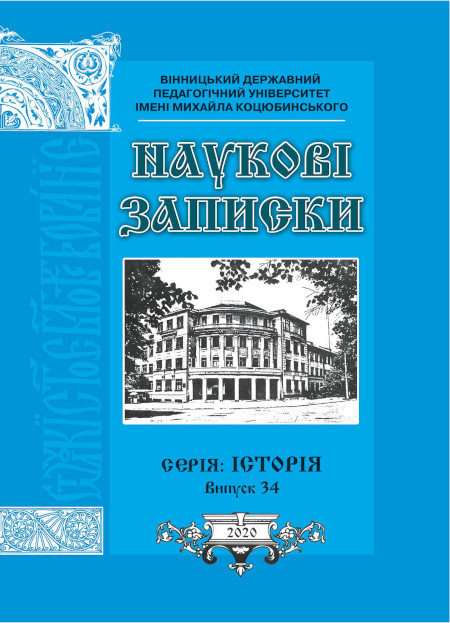Abstract
The purpose of the article is to cover the history and determine the relevance of Galician nationalism. The origin and development of the nationalist movement in the region is analyzed. In our study general scientific and special historical and political science methods were applied. The general scientific methods (deductive and inductive, analysis and synthesis) were used as specific cognitive tools necessary to implement the principles of historicism, systematicism and objectivity. The general and special historical methods (historical-typological, statistical, comparative-historical, problem-chronological) allowed us to make a comprehensive analysis of the problem of Galician nationalism. The scientific novelty of the work lies in the fact that the author, for the first time in the national historical science, analyzes the features of Galician nationalism, the history of its development and the current state. Galician nationalism took shape in the 19th century. Among the predecessors of Galician nationalism, three movements can be distinguished: provincialism, federalism, and regionalism. Provincialism (later called Galicianism) was a movement that emerged in 1840 with the aim of protecting the integrity of the territory of Galicia. Regionalism became an intermediate phase in the evolution of the Galician movement between provincialism and nationalism. Galician federalism began to develop in 1865. The federalists argued that Galicia should be formed as a canton within Spain and that it be governed by its own cantonal constitution. Conclusions. As one of the four historic autonomous regions of Spain (along with Catalonia, the Basque Country and Andalusia), Galicia is significantly different in its understanding of its own nationalism. While Catalonia and the Basque Country strive for even greater independence, including threats of secession from the state, the nationalist movement in Galicia is becoming less tangible.
References
Большая советская энциклопедия, (1971). Москва : Советская энциклопедия, Т. 6. 63.
Годлевская, В. (2013). Формирование государства автономий в Испании в условиях установления и консолидации демократии. Вестник Томского государственного университета. История, (25), 165–173.
Годлевська, В. (2011). Регіональні партії Іспанії в період консолідації демократії (1982–1996 рр.) Міжнародні зв’язки України: наукові пошуки та знахідки, 20, 377–389.
Данилевич, И. (1995). Автономизация Испании. Полис, 5, 121–129.
Дронова, С. (2019). Упадок и перспективы восстановления галисийского национализма. Общество: политика, экономика, право. 8(73).
Испания. (1982). Испания. Конституция и законодательные акты. Москва : Прогресс, 351.
Калинин, В. (1996). Испанская конституция 1978 г. Из истории европейского парламентаризма: Испания и Португалия, 123-125.
Кутузова, В. (2005). Националистические партии в политической системе Испании. Латинская Америка, 11, 62.
Нарумов, Б. (1987). Галисийский язык в XIX в. Формирование романских литературных языков. Современный галисийский язык. Москва : Наука, 166.
Хенкин, С. (1993). Испания после диктатуры (социально-политические проблемы перехода к демократии). М. : Наука, 200.
Antuña Souto, Carlos A. (2000). El nacionalismo gallego (1916-1936). Una madurez inconclusa Espacio. Tiempo y Forma, 13, 415-440. https://doi.org/10.5944/etfv.13.2000.3020
Bastos Boubeta, Miguel A. (2009). El nacionalismo gallego. Crítica, 961, 50-55.
Cotarelo, R. (1992). Valores y prinsipios de la Constitucion de 1978. Transicion politica y consolidacion democratica. Espana (1975–1986), 163-201.
González Calleja, E. (2005). La España de Primo de Rivera. La modernización autoritaria 1923-1930. Madrid : Alianza Editorial, 463.
Ley de 11 de julio de 1984 de creacion de la compañia de radio-television de Galicia. Boletín Oficial del Estado, 139, 11/6/1985, 17745-17748.
Ley de 9 de diciembre de 1983, reguladora del consejo asesor de RTVE en Galicia. Boletín Oficial del Estado, 13, 15/1/1985, 1120-1121.
Ley Orgánica 1/1981, de 6 de abril, de Estatuto de Autonomía para Galicia. Boletín Oficial del Estado, 101, 28/4/1981, 8997-9003.
Powell, Ch. (2001), Espana en democracia. 1975–2000. Barcelona : Plaza Janez, 685.
Prego, V. (1995). Asi se hizo la Transicion. Barcelona : Plaza Janez, 690.
Suárez Ramón, M. (2000). "España" y "Estado español" en el discurso político del nacionalismo gallego histórico (1886-1993). Historia y política: Ideas, procesos y movimientos sociales, 4, 171-208.

This work is licensed under a Creative Commons Attribution 4.0 International License.
Copyright (c) 2020 Scientific Papers of the Vinnytsia Mykhailo Kotsiubynskyi State Pedagogical University. Series: History




